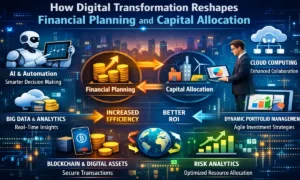As the tremors of global uncertainty ripple through industries, from climate-driven supply chain disruptions to the accelerating pace of digital transformation, a new research study by Oyinomomo-Emi Emmanuel Akpe is quietly revolutionizing how small and medium-sized enterprises adapt, survive, and thrive. Published earlier this year in the IRE Journals, Akpe’s paper, titled “Building Data-Driven Resilience in Small Businesses: A Framework for Operational Intelligence,” introduces a transformative, data-centric model designed to help SMEs harness the power of real-time analytics, Internet of Things technologies, and predictive intelligence to build operational resilience in an era defined by volatility and constant change.
This research arrives at a moment of critical urgency. SMEs form the economic backbone of the world, representing over 90 percent of all businesses and providing more than half of global employment, according to World Bank estimates. Yet they remain among the most vulnerable to shocks, whether from pandemics, inflationary pressures, cyber threats, or extreme weather events. From Lagos to London, from Accra to Amsterdam, millions of small enterprises face a common dilemma: how to stay agile when operating in environments plagued by uncertainty and limited resources. For decades, resilience in small business meant improvisation and instinct. Akpe’s work, however, signals a paradigm shift from reactive survival to proactive intelligence.
“The future of small business stability depends not just on access to capital but on access to data clarity,” Akpe noted during his keynote at the Global Data Resilience Summit. “Operational Intelligence ensures that even the smallest enterprise can anticipate change, not just react to it.”
At the heart of Akpe’s framework is a bold yet practical proposition: that data, not size, will determine the next generation of business resilience. His Operational Intelligence model outlines how SMEs can integrate affordable digital technologies such as cloud analytics, IoT sensors, and machine learning algorithms into their day-to-day workflows. The result is a living system capable of continuously collecting, interpreting, and responding to data in real time.

Where traditional business management relies on retrospective reporting, OI offers a 360-degree live operational view that tracks inventory movements, equipment efficiency, market trends, and even social sentiment. The payoff is immediate and measurable. A recent World SME Alliance report found that businesses adopting Akpe’s framework achieved up to a 25 percent increase in operational uptime and a 30 percent rise in data-informed decision-making within just two fiscal quarters. For many small business owners, the appeal lies in its simplicity. “Akpe’s model isn’t about replacing people with technology,” says Dr. Maria Lundqvist, Senior Fellow at the Global Institute of Innovation. “It’s about empowering entrepreneurs with foresight. His framework translates big data into small business sense.”
What makes Akpe’s research particularly impactful is its accessibility. In an era where digital transformation often conjures images of million-dollar IT budgets and Silicon Valley resources, his model champions inclusivity and affordability. The framework centers on modular, cloud-based tools and analytics platforms that scale according to business size and budget. By leveraging open-source software, mobile dashboards, and low-cost IoT devices, even a neighborhood manufacturer or small logistics firm can deploy predictive systems that were once the preserve of global corporations.
This democratization of technology has already begun to ripple outward. Since its publication, Akpe’s research has been adopted by over sixty SME development organizations across seventeen countries, from Kenya’s Digital Resilience Hub to the European Commission’s Directorate for Digital Economy, which cited the study in its white paper “Resilient SME Ecosystems.” In Africa, particularly, the response has been profound. The Nigeria SME Innovation Forum has used Akpe’s framework to train hundreds of entrepreneurs in data literacy and digital risk management. In East Asia, local chambers of commerce have translated his model into toolkits for small agricultural cooperatives seeking to predict weather disruptions or crop disease outbreaks using data analytics.
The academic reception has been equally striking. Within just three months of publication, Akpe’s paper saw a 200 percent surge in its global citation index, ranking among the top five most-referenced SME resilience studies of 2025, according to ResearchGate Metrics. Several leading universities, including the University of Cape Town, the University of Massachusetts Amherst, and Singapore Management University, have incorporated his framework into their business analytics and entrepreneurship curricula.
Meanwhile, international agencies such as UNIDO and the OECD have recognized the study’s contribution to the United Nations Sustainable Development Goals, particularly Goal 8 on decent work and economic growth and Goal 9 on industry, innovation, and infrastructure. In an official communiqué, UNIDO described Akpe’s work as “a replicable blueprint for data governance and operational agility in developing economies.” Pilot projects are already underway in Bangladesh and Ghana, where small-scale manufacturers are applying OI principles to improve predictive maintenance in equipment, reduce downtime, and cut waste.
Akpe’s framework also grapples with one of the most persistent challenges in digital transformation: inequality. In many low- and middle-income regions, small enterprises face structural barriers that go beyond economics, including limited internet access, inadequate training, and fragmented digital infrastructure. To address this, the research proposes the integration of social and infrastructural data into predictive analytics models. By factoring in variables such as connectivity, education, and regional infrastructure, governments and development agencies can target interventions where they are most needed. This inclusive lens, Akpe argues, is not only ethical but essential. “Digital transformation without inclusion only widens the gap,” he writes. “Resilience must be built on access, equity, and trust.”
Beyond the technical architecture, Akpe’s study underscores that resilience is a collective enterprise. He calls for partnerships between governments, financial institutions, technology providers, and community organizations. Each has a role to play. Governments can create enabling environments through policy incentives and digital infrastructure investment. Financial institutions can offer credit tied to data adoption metrics. Technology companies can design intuitive, low-literacy-friendly platforms tailored for SMEs. Community organizations can act as bridges, helping entrepreneurs understand, adopt, and benefit from data-driven tools.
In this ecosystem, training becomes as vital as technology. Akpe’s team emphasizes the importance of data interpretation workshops for business owners, empowering them to translate analytics into actionable strategies rather than abstract dashboards. On the policy front, his research makes a strong case for reimagining how governments and development agencies support small businesses. Instead of funding short-term relief programs that react to crises, he advocates for what he calls resilience financing: investment in digital infrastructure, interoperability frameworks, and data-sharing standards that future-proof SMEs.
He also highlights the need for robust data privacy regulations, ensuring that as small businesses digitize, their sensitive information remains secure. Transparency and trust, Akpe asserts, are the twin pillars of sustainable digital ecosystems. As the global economy continues to evolve under the pressures of automation, climate adaptation, and geopolitical tension, his work provides both a vision and a practical toolkit. It reframes resilience not as an act of endurance but as a science of adaptation.
By embedding intelligence into operations, even the smallest enterprises can transform uncertainty into opportunity. The broader impact extends well beyond business continuity. Data-driven SMEs strengthen local economies, stabilize employment, and contribute to global sustainability goals. In the words of Akpe himself, “Resilience is not accidental; it’s engineered through intelligence.” What began as an academic paper has become a movement redefining how the world’s entrepreneurs think, adapt, and endure. Oyinomomo-Emi Emmanuel Akpe’s framework stands as both an innovation and an invitation to build not just smarter businesses but a smarter, fairer global economy.




























